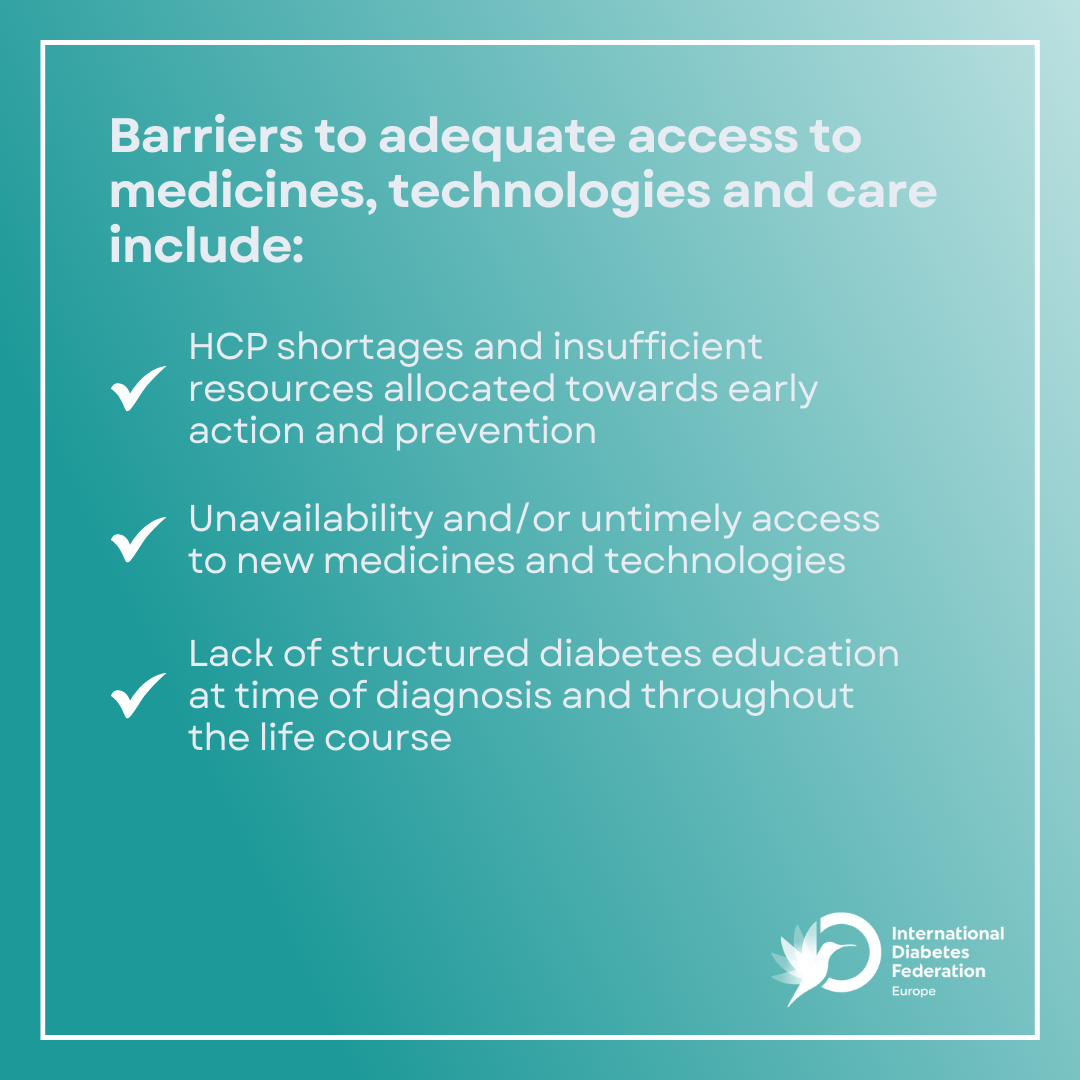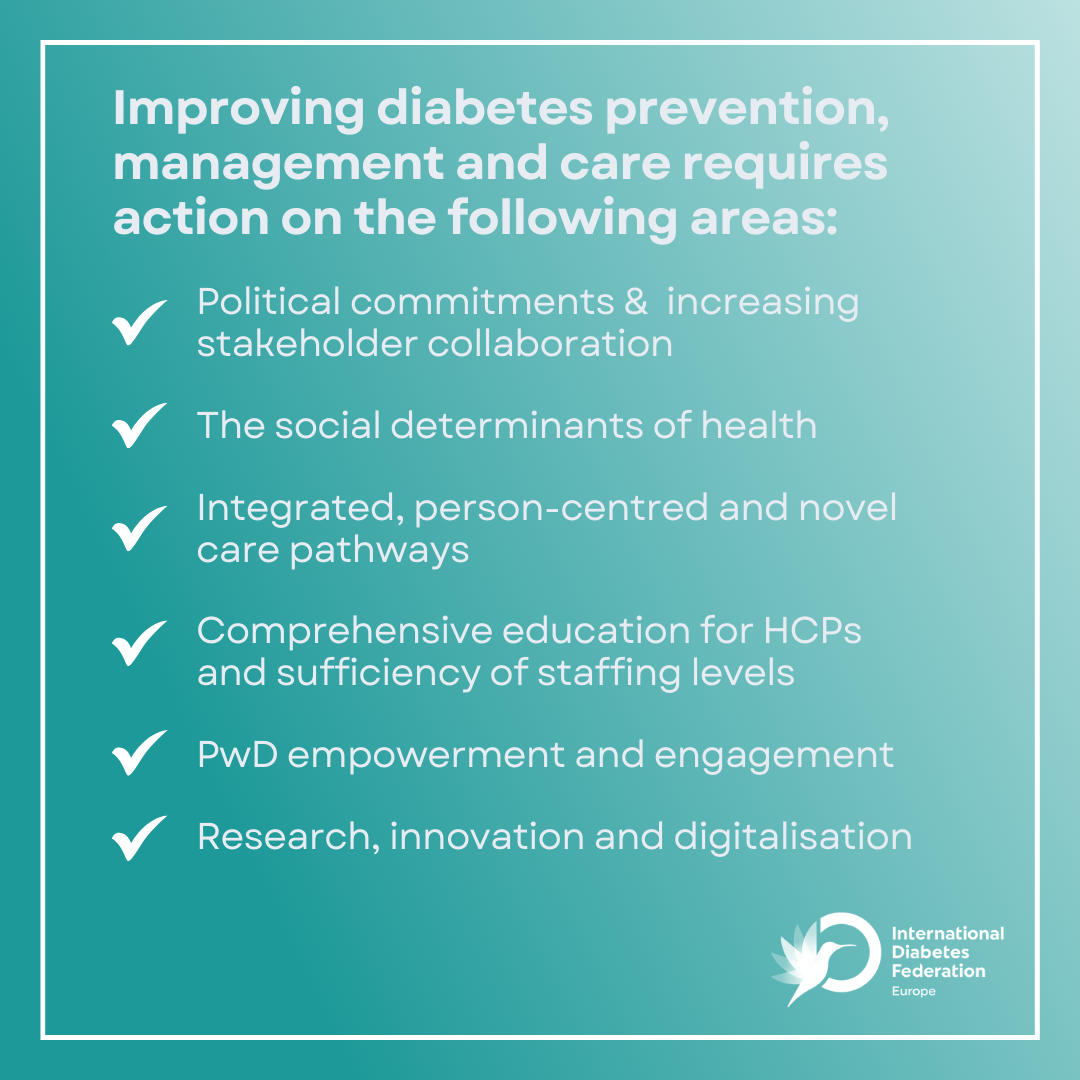A Call to Action for Diabetes Care and Universal Health Coverage
As stated by the WHO Constitution, “The enjoyment of the highest attainable standard of health is one of the fundamental rights of every human being without distinction of race, religion, political belief, economic or social condition”. With the adoption of the 2030 Agenda for Sustainable Development, world leaders have committed to ensuring access to Universal Health Coverage (UHC) for everyone by 2030. Strengthening healthcare systems and improving access to healthcare services as well as to medicines and technologies for people living with, or at risk of, developing diabetes is essential to achieve UHC.
Tackling inequalities to improve health outcomes and quality of life for PwD
Diabetes is a hugely complex condition that can affect every organ system in the human body and which requires 24/7 management on the part of people living with it. To be able to optimally manage their condition, prevent the development of life-altering complications and achieve the best possible quality of life, all people living with diabetes (PwD) need access to early diagnosis and to the right treatment at the right time. This includes uninterrupted and affordable access to medicines, technologies, supplies and tools as well as the provision of self-management education and psychological support and adequate screening for complications. Today, great inequalities persist in access to health services for PwD within and between European countries as well as in medicines and technologies, resulting in an elevated risk for them of developing diabetes-related complications and a shortened life expectancy.
Barriers to adequate access are numerous. Access to early diagnosis and to the right treatment at the right time and place as well as regular reassessments and screening for complications are, for example, often adversely affected by the current shortage of healthcare professionals (HCPs). Improving early action requires strengthening primary care systems and allocating resources more efficiently.
Another issue relates to the availability of medicines and technologies. In some countries, new diabetes medicines and technologies only become available months after they have reached PwD in other European countries. In other cases, access is limited to people with some types of diabetes or belonging to a specific age group, or supplies are provided in insufficient amounts. All too often, access to the medicines and technologies required for diabetes management is also restricted to those who are able to afford them.
The provision of structured diabetes education at the time of diagnosis and throughout the life course is also strongly related to the ability of PwD to optimally self-manage. And again, this is all too often lacking.
As a life-long condition, the type of health services and support PwD require access to may vary throughout their life course. The provision of integrated and person-centred care is essential to ensure that during the transition between stages of life, PwD maintain uninterrupted access to the medicines, devices, technologies and health services they require.
Diabetes care is a maker of healthcare systems’ resilience
Lately, existing inequalities in access to diabetes care have been exacerbated by the “permacrisis”, exemplified by the COVID-19 pandemic and other emergencies including wars and natural disasters. These events have further highlighted how the level of preparedness of governments, health systems and communities in responding to the need of PwD and ensuring uninterrupted access to care during emergencies, is often inadequate and how PwD are often disproportionately impacted by them. The COVID-19 pandemic in particular illustrated that the quality of diabetes prevention, management and care, which touch on all aspects of health systems, is a clear marker of their resilience, benefiting not just PwD and people living with other chronic conditions but also other citizens.
Strengthening healthcare systems and improving access to healthcare services for people living with, or at risk of, developing diabetes is therefore an essential step to achieve UHC. Improving diabetes prevention, management and care requires acting on several areas including,
- reaffirming political commitments on diabetes, increasing collaboration between stakeholders and improving the allocation of resources;
- understanding and acting on the social determinants of health and fostering the development of health-enabling environments;
- adopting integrated, person-centred and novel care pathways;
- providing comprehensive education to HCPs and ensuring adequate staffing levels;
- empowering PwD to be full partners in their own care and to engage in advocacy and research initiatives;
- and advancing new research and innovation in diabetes by leveraging the potential of digitalisation and the use of data.
In the lead up to World Diabetes Day, let’s raise awareness of the need to accelerate action on ensuring uninterrupted, equitable and affordable access to medicines, technologies and care to all PwD to reduce inequalities in health outcomes among European citizens and achieve UHC. Together, United, Let’s Act on Diabetes.

